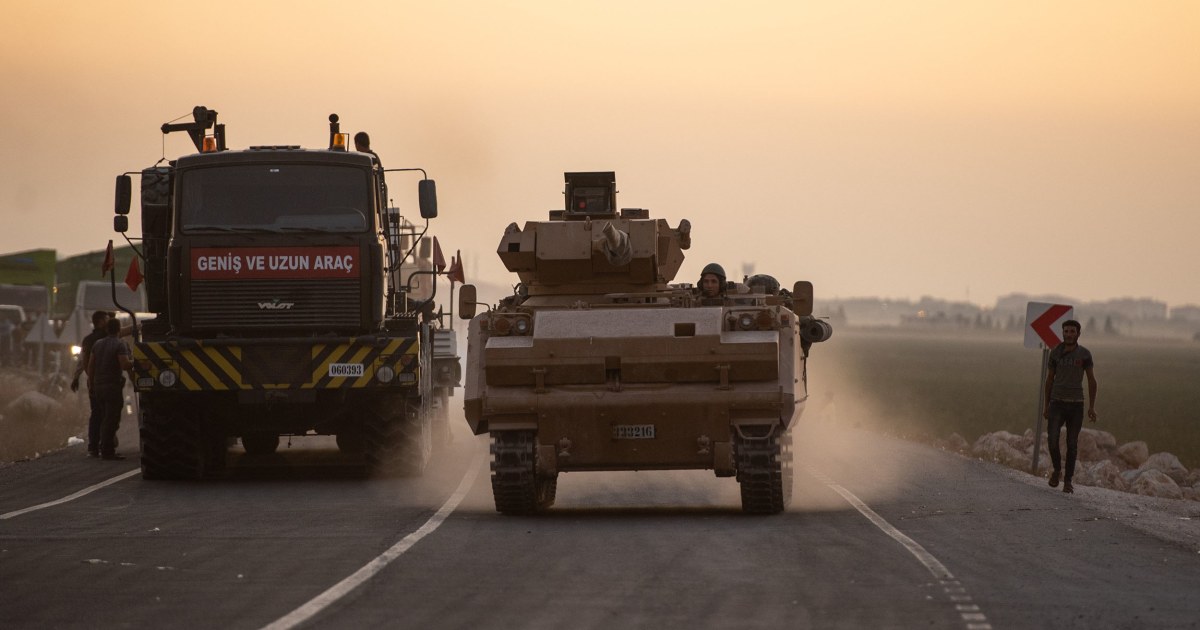ISTANBUL — Turkish forces advanced deeper into northeast Syria as part of a campaign to oust Kurdish fighters from the area, Turkey’s Defense Ministry said Thursday, expanding an offensive that has drawn a sharp rebuke from the international community.
The operation, including air and ground forces, targeted villages along the border with Syria and “continued successfully” early Thursday, the second day of the offensive, the ministry said in a statement. Turkey says it aims to create a “safe zone” in northeast Syria, where Kurdish-led forces are in control, but critics fear it could plunge the region into a fresh crisis.
Kurdish officials pushed back against claims of a Turkish advance, saying their fighters had repelled a ground incursion near the town of Tel Abyad overnight.
The Kurdish-led Syrian Democratic Forces, which partnered with U.S. troops to battle the Islamic State in Syria, said Thursday that Turkish shelling had targeted a prison holding some of the jihadist group’s fighters in the northeastern city of Qamishli. Thousands of Islamic State prisoners and their families are being held in camps and jails administered by Syrian Kurdish authorities.
In a separate statement on Twitter, SDF spokesman Mustafa Bali said that Turkey’s military hit a civilian convoy also near Tel Abyad, about a quarter-mile from the Turkish frontier, killing three.
Turkey views the Syrian Kurdish fighters as terrorists because of their links to Turkey’s Kurdistan Workers’ Party, or PKK, which has waged a decade-long battle in southeastern Turkey for greater autonomy. It launched its long-expected offensive targeting the SDF in northeastern Syria Wednesday, with airstrikes and shelling targeting its outposts along the border.
[Turkey wants a Syrian ‘safe zone.’ Others fear a ‘death trap.’]
Mortar fire from Syria landed in at least two Turkish towns, Turkish media reported.
The Turkish foray threatens to further fracture a war-shattered Syria, which has been devastated by a years-long conflict.
Mikael Mohammad, a shop owner from Tel Abyad, fled the town with his family Wednesday and slept in the open air in the countryside, he said.
“I had to leave with only the clothes I had on me,” he said in a telephone interview. “I immediately got in the car, picked up my family and drove. . . away from the border.”
“Everything I rebuilt in the last few years, I may have just lost again,” Mohammad said. “The shelling is barbaric and indiscriminate.”
The Syrian Observatory for Human Rights, a Britain-based war monitoring group, said that 16 SDF fighters had been killed since the operation began Wednesday, including in Ras al-Ayn, which is 75 miles east of Tel Abyad.
Nawras, a resident of Ras al-Ayn, described a night of intense shelling. Air strikes resumed in the morning, he said, prompting him and his family to flee.
“People are still leaving Ras al-Ayn as we speak,” said Nawras, an electrician. “I’m being told that the city is still being targeted and that we should not consider going back for now.”
The past weeks have seen a buildup of Turkish forces on the border, belligerent speeches by Turkish officials and dire warnings from Turkey’s NATO allies and others.
President Trump called the Turkish offensive “a bad idea,” but also stood by his decision to pull back U.S. forces to effectively clear the way for Turkey.
“Turkey has committed to protecting civilians, protecting religious minorities, including Christians, and ensuring no humanitarian crisis takes place,” he added. “We will hold them to this commitment.”
The offensive has presented the Trump administration with a dilemma as it has sought to balance Washington’s partnership with Turkey and its links to the Syrian Kurdish forces that helped beat back the Islamic State.
Erdogan’s government has watched nervously for years as Syria’s Kurds have built an autonomous enclave along Turkey’s border. It railed against the United States for relying on the Kurds as a military partner and bristled as its enemies accumulated weapons and territory.
For years, the United States and Turkey have been engaged in negotiations aimed at soothing Ankara’s security concerns.
There was also the risk that American troops still positioned in Syria could get caught in the crossfire.
A U.S. official said the Trump administration had provided Turkey with a list of no-strike locations where U.S. personnel were stationed.
Dadouch and Khattab reported from Beirut.
Read more
Syrian Kurds see American betrayal and warn fight against ISIS is now in doubt
Syria camp is at risk of falling under ISIS control, Kurdish general says
Today’s coverage from Post correspondents around the world
Like Washington Post World on Facebook and stay updated on foreign news
https://www.washingtonpost.com/world/middle_east/turkish-forces-push-deeper-into-syria-as-kurds-fight-back/2019/10/10/267ae2b0-eae6-11e9-a329-7378fbfa1b63_story.html
2019-10-10 13:49:00Z
52780401824835





